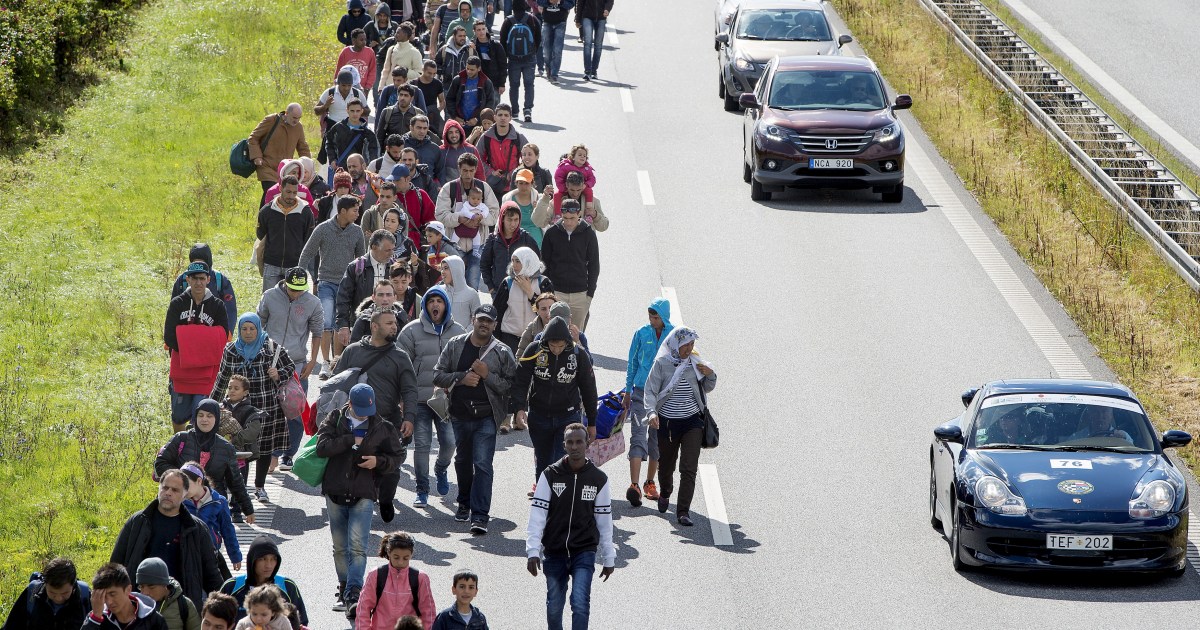Rehab Qassem sits in front of the Danish Parliament Square from morning until evening, waiting for her unknown fate after receiving the deportation decision, alone without her children, among hundreds of other Syrian refugees, the Danish authorities deemed their country safe to receive them.
Rehab Qassem, 65, protests the immigration department's final decision to deport her to Syria, and believes that it is an unjust decision, and that all of her family members live in Denmark and there is no one left for her in Syria, even her home in Yarmouk camp in Damascus was destroyed during the bombing in 2012.
She added in an interview with Al-Jazeera Net, "I am very scared and cannot return to Syria, and my fate there is unknown. My husband was martyred during the bombing of Yarmouk, and what I saw in Syria of death and pain is something unforgettable."
Rehab does not trust assurances of safety in her country, nor is she concerned with financial "lures" presented to her by the Danish authorities.
She points out that the immigration official told her that she could get an amount of money, nearly $ 3,000, to help her live in dignity inside Syria, but her answer is that she first needs security before the money.
Hundreds of people are threatened with deportation
Rehab Kassem is not the only refugee who was included in the Danish authorities ’decision to cancel the residency of those seeking protection in Denmark and deport them to Damascus and its countryside as safe areas.
The Danish authorities decided not to renew the residency of hundreds of Syrians, who have temporary protection residency.
The Danish authorities estimate the number of those whose residence permits will be withdrawn at about 500, the majority of whom are women and the elderly.
Denmark is the only European country that has started withdrawing protection for Syrian refugees and returning them to Damascus.
Justifications
The Danish government justifies its controversial decision by what it considers a change in security conditions in Syria, and indicates that tens of thousands of people from multiple countries have been able to safely return to Syria.
In this regard, the Danish Minister of Immigration and Integration Affairs Matthias Tesfay said in a previous statement published on the government website that there are about 100,000 refugees who have returned to Syria from the countries surrounding Syria, so the Syrians in Denmark should return as well, if circumstances allow.
In his statement, the Danish Minister indicated that the Damascus region and its countryside are considered safe, which means that the Protection Law (7.3) granted by the Danish authorities to refugees is no longer valid for people coming from there.
But he stresses that Denmark is willing in return to give money to those who have to return and rebuild their lives in Syria.
According to the Danish Refugee Grievances Council, conditions in Damascus are no longer dangerous, at the level that pays for granting or extending temporary residence permits as stipulated in the Aliens Act (temporary protection status).
The Danish government also based that estimate on testimonies from 11 people stating that Damascus is considered a safe area.
However, the human rights activist and one of those in charge of the open sit-in in front of the Danish Parliament Square, Muhammad Ziyad al-Abdullah, said that among these testimonies, a testimony from an officer in Syrian immigration and passports, on which the government relied in its decision to tighten immigration laws within the so-called model change.
He adds that "11 people out of 12 of those who based the report on their testimonies denied what the report came after it was published by the Danish authorities, and it was found that it was based on testimonies that were distorted and what was stated in them."
Resentment of my rights
The decision of the Danish government to revoke the residency of Syrian refugees from Damascus sparked the discontent of human rights organizations, activists and party representatives in Denmark.
And organized many demonstrations against the deportation of refugees in several cities in Denmark, in which thousands participated, and an open sit-in was organized in front of the parliament headquarters in the capital, Copenhagen, to demand the government to repeal the deportation laws.
Al-Abdullah affirms that the sit-in currently open in front of Parliament rejecting deportation decisions will continue until the government revokes the decisions related to the withdrawal of residence permits, and considers Syria insecure in the existence of the current regime.
He stressed that they are also calling on the government to cancel "the Model Change Law that restricts immigrants' lives and strips them of their rights."
Since the outbreak of the revolution in Syria, about 1.5 million Syrians have sought asylum in Europe, 35,000 of whom obtained residence permits in Denmark, including permanent residence permits usually given to those who fled because of personal persecution, in addition to temporary protection permits that are given to people coming from conflict areas.

